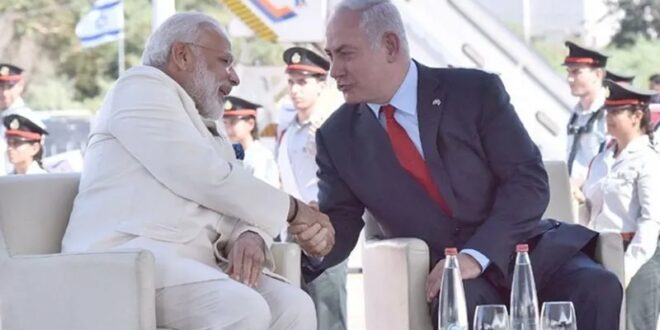India’s engagement in the Middle Eastern Quad in the form of I2U2 partnership strategically situates it as a key international player in the complexities of Middle Eastern conflicts. The repercussions of this positioning have become apparent in the form of India potentially facing isolation, particularly in the realms of politics and diplomacy. This was notably exemplified by India’s decision to abstain from supporting a ceasefire in the Israel-Hamas War, aligning itself with Israel. This alignment raises the risk of India being perceived as taking sides in these conflicts, potentially resulting in diplomatic isolation and unintended ramifications for its foreign policy objectives.
India’s alignment with Israel in the Gaza war can be attributed to several factors. Firstly, Israel’s significant role as one of India’s top arms suppliers in 2021 highlights the strategic importance of their defense partnership. The exploration of coproduction of weapons systems further deepens this defense cooperation. Additionally, there are indications of a shift in India’s business community’s perception of Israel, as demonstrated by the successful bid by the Adani Group and an Israeli partner for Haifa Port, worth $1.2 billion. This suggests a growing interest in investment opportunities and economic cooperation. Furthermore, ongoing negotiations for an India-Israel Free Trade Agreement underscore the strategic significance of Israel for India. These factors contribute to India’s alignment with Israel in the Gaza war. Overall, India’s alignment with Israel can be attributed to the strategic advantages gained through defense cooperation, growing economic interests, and the potential for enhanced trade relations.
Nevertheless, it is of equal significance for India to reassess its partial foreign policy approach towards the Middle East, given the potentially severe implications it carries. India’s decision to align with Israel in the Israel-Gaza conflict holds the capacity to undermine its longstanding policy of non-alignment in the Middle East, a principle integral to its foreign policy framework. Importantly, such an alignment may complicate India’s ability to adeptly navigate the intricate regional dynamics of the Middle East and to realize its strategic goals. The Middle East, characterized by its complexity and volatility, features numerous ongoing conflicts and divergent interests.
India’s relations with Middle Eastern nations have exhibited multifaceted connections. Particularly noteworthy are the burgeoning collaborations in the military and technology domains between India and Israel, reflecting an expanding partnership in defense and technology sectors. However, India’s alignment with Israel in the Gaza War gives rise to apprehensions regarding strained relations with Arab states, which have traditionally voiced criticism of Israel’s actions in the region. Additionally, it raises queries about the potential impact on India’s energy security, given the substantial role played by Arab states as major suppliers of oil and gas to India.
More specifically, this alignment may be perceived as a setback for the ‘I2U2’ partnership, which aims to establish a robust security framework in West Asia. This collaborative effort involves India, Israel, the United States, and the United Arab Emirates, with India assuming the role of a mediator and an extra-regional overseer. This partnership aims to create a balance of power in the region. By aligning with Israel, India may strain diplomatic relations within the partnership and erode its reputation for impartiality and neutrality, potentially challenging the core principles of fostering cooperation and regional stability within the ‘I2U2’ framework, and undermining India’s role as a balancer and extra-regional manager. India’s participation partnership in I2U2 is driven by its global ambitions, seeking strategic independence beyond South Asia. This engagement holds significant importance for India due to the potential strategic benefits it offers, including economic and energy security, access to advanced defense technologies, and a role as an international stakeholder in key maritime regions. India’s military presence in the Middle East is exemplified by initiatives such as its involvement in maritime security operations in the Gulf.
However, India’s alignment with Israel in the Israel-Gaza conflict may compromise its traditional policy of non-alignment in the Middle East, straining relations with Arab states. It also raises concerns about India’s energy security and its ability to navigate the complex geopolitical dynamics of the region. Additionally, India’s role as an international manager for the U.S. in the Middle East has raised concerns among regional states in South and East Asia, particularly in relation to its strategic rivalries with China and Pakistan.
In conclusion, India’s alignment with Israel in the Israel-Gaza conflict carries significant implications for its foreign policy in the Middle East. India’s approach to the Middle East has shifted from ideological solidarity to a more strategic engagement with countries like the United States, Israel, and Gulf states, focusing on economic development and security cooperation. India appears to be incautious about balancing its relationships with the broader Middle Eastern Region’s interests. In the context of the Gaza conflict, India’s evolving Middle East strategy could be influenced as it seeks to balance various relationships while prioritizing economic development and security cooperation, potentially complicating India’s ability to maintain a balanced foreign policy in the complex Middle Eastern geopolitical landscape.
 Eurasia Press & News
Eurasia Press & News




